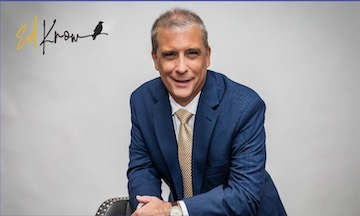
Interview with
Ed Krow:
Transforming Your Leadership Skills

 Get it on Stitcher HERE.
Get it on Stitcher HERE.Leadership is Redefining “Profit” see my post HERE

In his career, Ed has helped over 250 clients, including Fortune500 companies, achieve talent and culture transformations. As a result, audiences value Ed’s deep understanding of the employee/employer dynamic and his ability create a connection with them right away. On stage, he provides practical approaches, tools, and relevant stories to inspire action.
A speaker, trainer and coach certified by The John Maxwell Team; Ed’s topics bring a refreshing perspective on how to leverage what is commonly viewed as “people problems” and turn negative growth into business success.
Ed is a member of the National Speakers Association, the Forbes Coaches Council, and a regular contributor to Forbes.com. He is the author of “Strategic HR: Driving Bottom Line Results Through Your People.”
When he’s not on stage or helping clients, Ed teaches at Millersville University. His first love is family, with golf vying for atight second. If you do catch him at home, he’s likely cheering forthe Notre Dame or Baltimore Ravens football teams
Thoughts from Ed Krow
Be Like SALT:
A Well-Seasoned Approach to Leadership
I’d like you to think about what salt does for us. Our bodies need sodium as a vital nutrient. Salt is a preserver of foods and meats. Salt enhances flavor for us in our food. In olden times, salt was extremely valuable and was used as a trading mechanism. In fact, the word “salary” comes from the Latin word for salt. Now, we’re not sure why, although there are some stories that say that Roman soldiers, during the height of the Roman Empire, were actually paid in salt due to its value. In fact, the availability of salt has been pivotal to civilization.
Perhaps you’ve heard the phrase, “She’s salt of the earth”? When we say that, we mean that person is a good and honest person.
At any rate, why do I say that we need to be like salt? As leaders, it’s our job to enhance our people to make them better than they were when they came to us. That’s the same thing that salt does for our food: It makes it taste even better.
As leaders, isn’t it our job to engage our people and preserve them for the company, just like salt does for foods? And isn’t it our job to ensure that our workplace is healthy, thriving and has all the nutrients it needs to be successful? Just like salt for the human body.
When we think about salt, we probably take it for granted. It’s on every restaurant table; it’s in every kitchen; it’s probably on your dining room table. It’s there when we need it to add a touch of spice to things. As leaders, we need to be there, be readily available for our people. It’s OK if we’re in the background, but we’re there when they need us to add that little pizzazz that they need to get through their workday or to get through that big project.
However, we also know that too much salt is not good for us. It can cause high blood pressure, among other things. Being an overbearing leader can have the same result. Not allowing our people to make decisions for themselves, not allowing our folks the opportunity to thrive on their own without our influence, is extremely detrimental. An overbearing leader stifles the creative flavor of their people, much like using too much salt on food takes away from the enjoyment of that food. If we routinely over-lead our people, it’s not healthy for their development or for their long-term engagement with the organization.
I believe we need to be like salt. We need to put just enough leadership out there for our people to enhance what they’re doing, to make what they’re doing even better, without going overboard and ruining it. We need to make sure that we are preserving our people for the future of the organization, again by leading them well.
Some of you may be aquarium enthusiasts, and of course, you can get and maintain saltwater fish in an aquarium. For those of you who are into that hobby, you know how important it is to maintain the level of the salt in the saltwater so that delicate balance will allow the fish in the tank to thrive. Why is the Dead Sea dead? Because of elevated salt levels.
So, as leaders, how do we figure out what the right level of salt is in our organization? I believe the way to do that is to be out with our people. How do you know how much salt to put on your food? You taste the food first; perhaps you add a little bit of salt and then try it again to see if the flavoring is to your liking. That’s how we need to be as leaders. We have to dip our toes in the water to see exactly how much leading our people really need — how much they need us to manage their day-to-day activities versus simply setting the vision and allowing them to go for it.
I’d ask you to consider how salty you are. Do you spread just enough seasoning around your workplace to make your people thrive, or is there not enough? Are you not giving your people enough, and therefore the workplace is bland and uninspired? Perhaps you’ve realized that you are over-salting your workforce and you’re there too much and are micromanaging things. Maybe it’s time to step back a little bit.
The bottom line is this: If we can be like salt and know just how much to season our people, they will thrive! They will be “flavorful.” They will be excited to be a part of our organizations. And so I’d ask you to consider how you need to change your style to meet what your people want. What “flavoring” do they need in order to thrive in your organization? So much has been written about good leadership, and I believe it comes down to knowing what your people need from you at any given point in time. That’s the mark of a good leader.
I ask you today: What do you need to do to be more like salt? How can you be a leader who is salt of the earth?
The Transformational Leadership Strategist
Subscribe to The Transformational Leadership Strategist by Email


